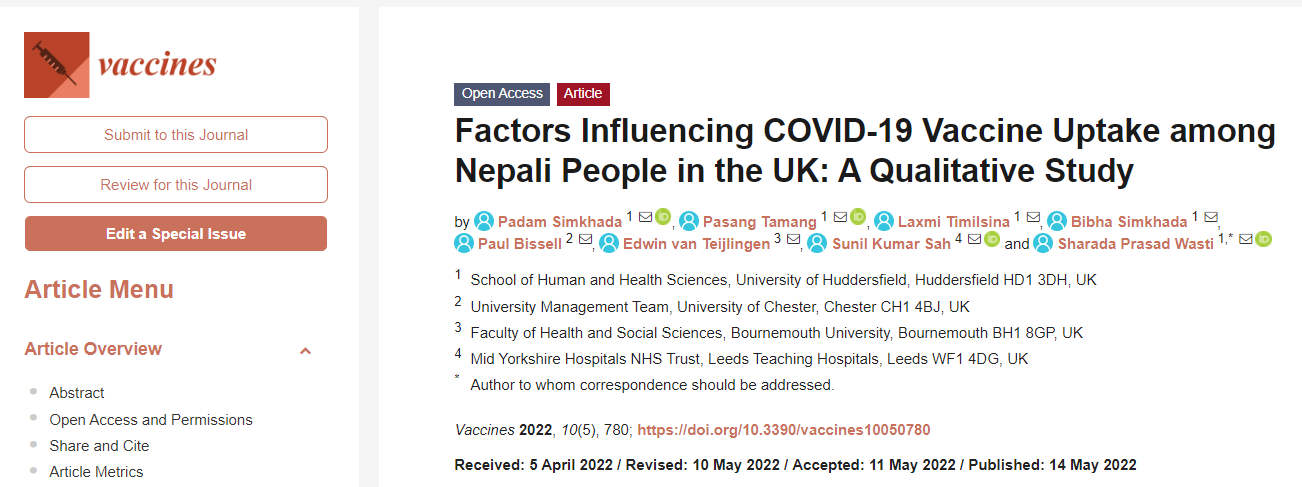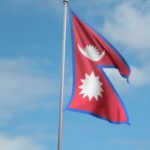This month CMMPH has two new research papers focusing on COVID-19. The first one published in World Medical & Health Policy reports on a quantitative study of the availability of hand-washing facilities in households across Nepal [1]. This study used secondary data from Nepal Demographic Health Survey (NDHS) 2016 to assess the association between households’ wealth status to handwashing stations. The findings reported a statistically significant association between age of the household head, residence place, ecological zone, province, wealth status, having of mosquito net, having a radio, and TV at respondents’ household to fixed hand-washing stations at their households.
The second paper published three days ago in Vaccines is a qualitative study of of interviews with Nepali immigrants living in the UK and their attitudes towards COVD-19 vaccination [2]. Vaccination saves lives and can be an effective strategy for preventing the spread of the COVID-19, but negative attitudes towards vaccines lead to vaccine hesitancy. This study aimed to explore the factors influencing the uptake of the COVID-19 vaccine in the Nepali community in the UK. This study found that attitudes towards COVID-19 are generally positive. Nine overlapping themes around barriers to COVID-19 vaccination were identified: (a) rumours and mis/disinformation; (b) prefer home remedies and yoga; (c) religion restriction; (d) concern towards vaccine eligibility; (e) difficulty with online vaccine booking system; (f) doubts of vaccine effectiveness after changing the second dose timeline; (g) lack of confidence in the vaccine; (h) past bad experience with the influenza vaccine; and (i) worried about side-effects. Understanding barriers to the uptake of the COVID-19 vaccine can help in the design of better targeted interventions. Public health messages including favourable policy should be tailored to address those barriers and make this vaccination programme more viable and acceptable to the ethnic minority communities in the UK. This Vaccine paper includes two FHSS Visiting Faculty as co-authors: Prof. Padam Simkhada and Dr. Bibha Simkhada.

Prof. Edwin van Teijlingen

References:
- Sharma, M., Adhikari, R., van Teijlingen, E. (2022) Handwashing station in Nepal: Role of wealth status in establishing a handwashing station, World Medical & Health Policy Accepted
- Simkhada, P., Tamang, P., Timilsina, L., Simkhada, B., Bissell, P., van Teijlingen, E., Sah, S.K., Wasti, S.P. (2022) Factors Influencing COVID-19 Vaccine Uptake among Nepali in the UK: A Qualitative Study, Vaccine 10(5), 780;https://doi.org/10.3390/vaccines10050780
 2021: More COVID-19 publications
2021: More COVID-19 publications Two health and migration papers published in two days
Two health and migration papers published in two days










 Beyond Academia: Exploring Career Options for Early Career Researchers – Online Workshop
Beyond Academia: Exploring Career Options for Early Career Researchers – Online Workshop UKCGE Recognised Research Supervision Programme: Deadline Approaching
UKCGE Recognised Research Supervision Programme: Deadline Approaching SPROUT: From Sustainable Research to Sustainable Research Lives
SPROUT: From Sustainable Research to Sustainable Research Lives BRIAN upgrade and new look
BRIAN upgrade and new look Seeing the fruits of your labour in Bangladesh
Seeing the fruits of your labour in Bangladesh ECR Funding Open Call: Research Culture & Community Grant – Apply now
ECR Funding Open Call: Research Culture & Community Grant – Apply now ECR Funding Open Call: Research Culture & Community Grant – Application Deadline Friday 12 December
ECR Funding Open Call: Research Culture & Community Grant – Application Deadline Friday 12 December MSCA Postdoctoral Fellowships 2025 Call
MSCA Postdoctoral Fellowships 2025 Call ERC Advanced Grant 2025 Webinar
ERC Advanced Grant 2025 Webinar Update on UKRO services
Update on UKRO services European research project exploring use of ‘virtual twins’ to better manage metabolic associated fatty liver disease
European research project exploring use of ‘virtual twins’ to better manage metabolic associated fatty liver disease